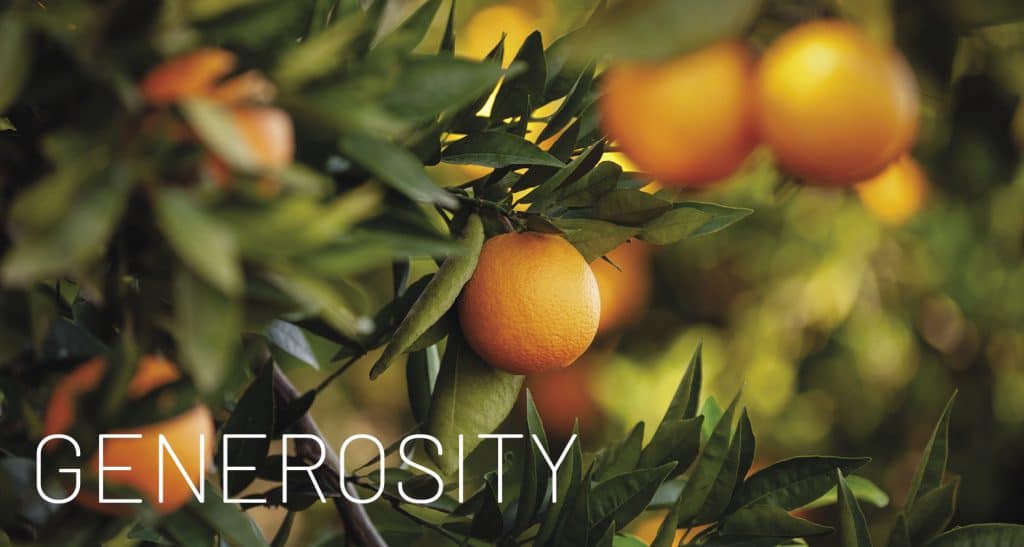By virtue of our Baptism and Confirmation, we receive the gifts of the Holy Spirit. This author offers practical ways we can cultivate them in our everyday lives.
In Baptism and Confirmation, we receive the gifts of the Holy Spirit. As we put those gifts to good use, they manifest as the “fruits of the Holy Spirit” in our attitudes and behaviors. What exactly are those fruits? And how can we live them better?
We read about the fruits of the Holy Spirit in St Paul’s Letter to the Galatians: “The fruit of the Spirit is love, joy, peace, patience, kindness, generosity, faithfulness, gentleness, self-control” (5:22–23). This article reviews these nine scriptural fruits of the Holy Spirit and examines how to cultivate them.
But first, a caveat. Fruit is the result of growth and our increasing awareness of the presence of the Holy Spirit in our lives. It takes cooperation, not determination; openness, not resolve. For the Holy Spirit to work in us, we must learn to hear that still, small voice. As the psalmist reminds us, “Be still and know that I am God!” (46:11).
With that in mind, let’s look at each fruit of the Spirit.

“I give you a new commandment: love one another. As I have loved you, so you also should love one another. This is how all will know that you are my disciples, if you have love for one another.” —John 13:34–35
This love is not the heartwarming feeling you get snuggling with your child or spending time with your spouse. In fact, it’s not a feeling at all. It’s an action: the ability to put others’ needs before our own. One of my favorite hymns is “They Will Know We Are Christians by Our Love.” That should be our goal. Our love for God spills out to others as God loves them through us.
So how do we grow in our capacity to love in this profound way? Volunteering is one approach. Be a greeter at church, stack shelves at the food pantry, serve at your local soup kitchen, visit a lonely nursing home resident, or wash towels for an animal shelter. No matter where you live or what your situation might be, there is always an opportunity to help someone else. As you come to know your gifts and your community more clearly, you will come up with more ways to help. It’s one of the best ways to grow in unselfish concern for others.
Joy
“I have told you this so that my joy may be in you and your joy may be complete.” —John 15:11
Joy is not just temporary pleasure but an enduring interior contentment that isn’t shaken by the circumstances around us. It doesn’t come from the world. No amount of money, possessions, health, or relationships can bring this profound happiness. Joy sees the world as God intended; it is a reaction to all God is doing in our lives now and in the future. It is a choice we make based on the knowledge that God loves us and is with us through all our life experiences.
One simple way to increase joy is to smile more. You may feel awkward at first, but it works. Start by imagining yourself smiling happily, like a child playing on a swing set or jumping in the ocean waves. Then practice it in the mirror—a great big toothy grin. A genuine smile involves the eyes and the mouth. It releases stress-lowering neurotransmitters like serotonin and dopamine into the bloodstream. This means that smiling begets more smiling. It reminds us that there is still joy in life.
Peace
“Peace I leave with you; my peace I give to you. Not as the world gives do I give it to you. Do not let your hearts be troubled or afraid.” —John 14:27
Peace is a sense of harmony, inner tranquility, and calm reliance on and trust in God. In the modern world, peace can seem hard to come by. We are continually bombarded with news that causes fear and anxiety. Wars, storms, forest fires—there is no end to the number of things we can worry about. We end up feeling scattered and distracted. But Jesus reminds us that peace isn’t found in the world.
So how do we find this elusive peace? One way is to disconnect from technology for part of every day. Start with a half hour. Turn off the cell phone, computer, and TV—no news, no calls, no message notifications, no multitasking, no Internet games to pass the time. Try deep breathing, praying, taking a walk outside, whatever helps most to give your brain a break. Ask the Holy Spirit to bless your time so you can hear God’s voice. Remind your ego that the world will be fine if you are detached from it for a little while.

“Whoever is patient has great understanding, but the one who is quick-tempered displays folly.” —Proverbs 14:29, NIV
Merriam-Webster defines being patient as “bearing pains or trials calmly or without complaint.” Remarks like, “The person in the checkout line took forever!” and “Our waitress was so slow!” permeate everyday life. Patience requires that we ignore our own schedule and trust God’s instead. It allows us to consider new ways of viewing our experiences. The long wait in the grocery line gives me a chance to notice the delightful flower display at the front of the store. The harried waitress’ plight offers me an opportunity to reach out with a compassionate smile.
Becoming patient takes practice and time. Try the “bell” exercise. Sit in a quiet, comfortable spot. Use a singing bowl or bell to make a tone and focus on the sound as it gradually diminishes. Sit as still as you can until it stops completely.
Gradually ring the bell louder to maintain the note longer. Set a timer if you don’t have a bell or singing bowl. Start with 30 seconds, and don’t move during that time. If your nose runs, let it. If you have an itch, acknowledge it, but don’t scratch it. At first, you may have to distract yourself, but as you improve, you will be able to focus on the waiting.
Kindness
“Your kindness should be known to all. The Lord is near.” —Philippians 4:5
At the root of kindness is compassion—the ability to suffer with others. When we learn to pay attention to others enough to suffer with them, we can anticipate their needs and reach out with a helpful and thoughtful mindset. Sometimes, we’re just too busy, and opportunities are missed.
One way to grow in kindness is to help one person every day. The gesture can be simple, like a sincere compliment or a cup of coffee. You can offer to listen to a friend having a tough time or help a colleague brainstorm a project. You can perform greater acts of kindness when you have more time and energy and smaller ones on your own challenging days. It gets easier as you get into the habit of paying attention.

“Give to everyone who asks of you, and from the one who takes what is yours do not demand it back.” —Luke 6:30
Like all fruits of the spirit, generosity is not something we can accomplish on our own. It is the capacity to give liberally, above and beyond what is expected or owed. It has nothing to do with the size of the gift but more with our readiness to give. Generosity recognizes that everything we have comes from God.
All too often, we give from our surplus. We donate the money left over at the end of the month to charity. We clean our closets and drop off the stuff we don’t want at Goodwill. Cultivating generosity involves learning how to give more than our leftovers. It’s a radical idea in a world that teaches us to value stuff above all else.
Practicing is the only way to become generous. Plan to give something away each week. It can be time, talent, or treasure and may hurt at first. That’s good! Over time, it will get easier, and you will develop a sense of abundance.
Faithfulness
“For I am already being poured out like a libation, and the time of my departure is at hand. I have competed well; I have finished the race; I have kept the faith.” —2 Timothy 4:6–7
Faithfulness can have two meanings. In one sense, it refers to faithfulness in our relationship with God. We believe in him, are faithful to his commandments, and do our best with whatever he asks us. It also refers to our relationships with others. We are consistent, dependable, and trustworthy; we keep our promises and commitments. Faithfulness is loyalty to God and others.
Sometimes we have trouble seeing ourselves as dependable, and when we fail at it, we give up trying. A daily affirmation practice can help reorient our thoughts to more positive ones. Throughout the day, each time you look in a mirror, say, “God is reliable and faithful to me. I am reliable and faithful to others.”
Gentleness
“Blessed are the meek, for they will inherit the land.” —Matthew 5:5
Gentle is another word for meek. It refers to the ability to respond mildly, tenderly, and humbly. Some people incorrectly interpret it as weakness or submissiveness, but that is not the case. Being gentle takes great strength, but it is strength used to help others, not to lord over them. Jesus was the epitome of gentleness. Fully God and, therefore, fully capable of destroying his enemies, he did not. He spoke with mercy and forgiveness to even the worst sinners.
It’s easy to respond to others in a harsh or angry way when we are tense or anxious. Gentleness requires calm. One way to grow calm is with a technique called the body scan. Sit (or lie) in a comfortable position and close your eyes. Take a few deep breaths, fully expanding your chest. (It might take a few tries to relax enough to do that). Then, starting with your feet and slowly moving up, breathe in, and on the exhale, consciously soften each part of your body: feet, ankles, calves, knees, thighs, hips, buttocks, low back, abdomen, upper back, chest, shoulders, neck, face, and scalp. Be sure to soften your shoulders, loosen your neck, and unclench your jaw. If your body is relaxed, your reactions to others will be too.
Self-Control
“For God did not give us a spirit of cowardice but rather of power and love and self-control.” —2 Timothy 1:7
Self-control invites moderation and self-mastery. It is the ability to say no when we want to say yes, and to see the results of our choices ahead of time so that we can avoid those who cause harm to ourselves or others. We face hundreds of options daily, whether with food, exercise, relationships, or leisure activities. We don’t always make good choices in times of temptation or frustration. It’s not helpful to lash out if my coworker makes me angry. It is much more productive to step away and return after I calm down.
The first step in self-control is self-awareness. Learn to check in with yourself throughout the day. Alcoholics Anonymous recommends asking, “Am I hungry, angry, lonely, or tired?” At these times, we are more likely to succumb to temptation. Learn to recognize the physical signs of these states in your own body. Am I cracking my knuckles or am I fidgety? Recognizing your mood allows you to remove yourself from a tense or tempting situation before you make a bad decision.
We can’t make these changes overnight. But we can practice over a lifetime and nurture the fruits of God’s gifts within us. As we do, our reactions and behaviors will preach the Gospel to a world that needs it. We will live a fruitful life.









1 thought on “How to Grow in Holiness ”
Thank you, Colleen Arnold, for what you said about love. You said, “Love is not a feeling at all. It’s an action: the ability to put others’ needs before our own.” I wrote that down and will include it in my scrapbook.
So, then love is not merely a sentiment? I guess not. Pleasure is not about love either. That’s merely a feeling, once again. I guess feelings can be different from emotions. So, one can feel hot or cold, without emotions being a factor. Then, what are emotions? A higher form of consciousness that can be tethered to feelings too? It’s been said that belief is an emotional thing. Which means what? I guess faith would be a higher form of consciousness, once again.
As far as Mathew 5:5, the Chinese Bible has interpreted the word “meek” as “simple.” Is that the correct translation into English and not “meek,” since the English language has changed over time? The word “meek” has taken on a negative connotation in our language, which leaves some people scratching their heads on that Bible verse. In the Oriental cultures, the word “simple” has a positive connotation that we in the West can learn from.
Comments are closed.